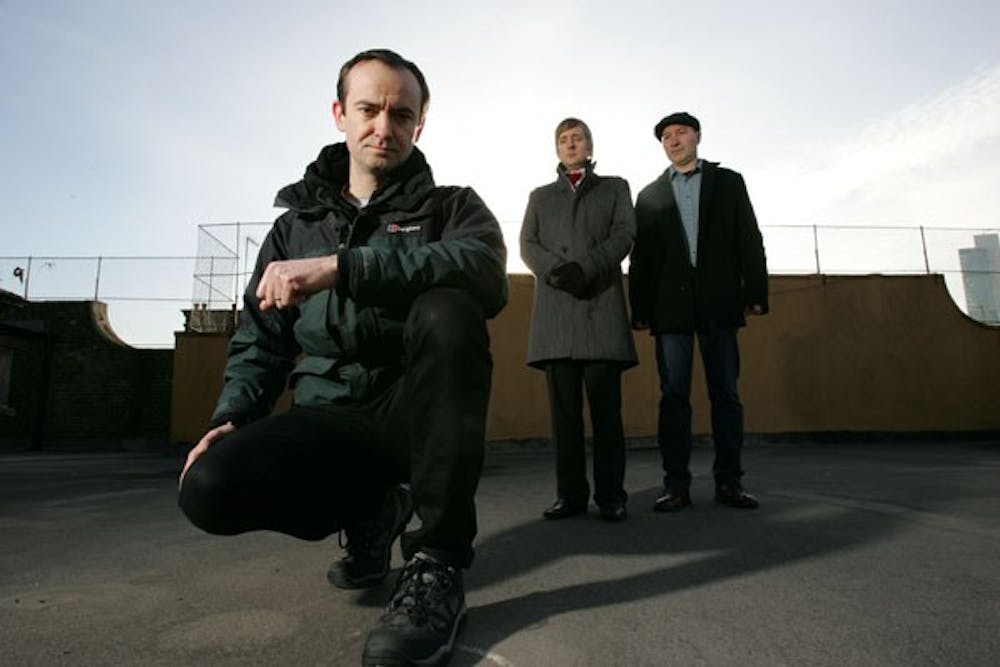“Crying With Laughter” and “Erasing David,” two films featured in the SXSW Film Festival films by the FilmBuff company, lie on completely different sides of the movie spectrum.
Scottish film “Crying With Laughter” is an interesting cross between a dark psychological thriller/drama and a biopic on the stand-up comedy scene. Ne’er-do-well comedian Joey Frisk’s life is a precarious balancing act between gigs and nightly backstage debauchery. In the midst of all this, he also has a 6-year-old daughter, an ex-wife fed up with his antics and a landlord tired of not receiving his rent. As if Joey doesn’t have enough on his hands already, he runs into Frank, an old schoolmate of his, who happens to be in the audience one night. That is when things take a dramatic turn for the worse and go from chaotic to dangerous, kidnapping included. Frank is determined to drag Joey into a past that may or may not have occurred and has a vendetta he plans to see through.
Director Justin Molotnikov’s cinematography of beautiful Edinburgh is excellent, as is his use of a comedy routine as the narrative tool for telling the story. Malcolm Shields plays Joey with the perfect mixture of blustery bravado and goofy vulnerability. Even though the dark and violent element of the film comes out as a bit of a surprise, it is not so far-fetched as to be implausible. The plot is not melodramatic and while this is far from a comedy, there are enough lighthearted moments to interject the dark ones. The film is novel and refreshing in both the plot and genre-bending.
“Erasing David,” a documentary about our very imperiled privacy in the information age, has a good premise but awful execution. Director David Bond decides to go on the run and see if he can “take himself off the grid,” hiring a top private security firm to track him down. The film essentially follows three storylines: Bond’s quest to find out just how much information there is about him in various databases [public and otherwise], the efforts of the private investigators to find him and his own “in hiding” travel diary.
The stronger parts of the film are Bond’s narration of just how much information there is out there about him — including every car trip he has made into London, for example. A huge caveat is that the movie is set in the United Kingdom, and Bond is actually able to write to various companies and agencies and request they send to him all the information they have of him — a very unlikely scenario in the United States.
Bond’s interviews with people who have suffered due to “mistaken identity” scenarios where their names appear in databases are quite compelling and scary. His own travelogue, however, is hokey at best and inane at worst. He makes so many “mistakes” and leaves so many trails behind that it is almost as though he is not even trying to hide. He checks his e-mail, answers his cell phone and puts un-torn travel documents in the trash. The efforts of the private investigators are also not particularly impressive — Bond goes to visit his parents, a place they rather obviously assume he would go. It seems like neither Bond nor the private investigators are trying very hard. How often does rummaging through trash actually lead to important clues? Every time, apparently, according to “Erasing David.”
The movie is important in bringing to light how difficult, if not impossible, it is to maintain any sense of privacy in the age of surveillance and readily available information on any one of us. But it also brings up the important point that sometimes we are the ones who should monitor how much information we are making publicly available, be it on social networking sites or other means. It would have been much more interesting if Bond had interviewed more privacy experts with more insightful information, rather than platitudes most people already know or borderline hysteric doom-and-gloom commentary.
You can reach this writer at thescene@theeagleonline.com.





